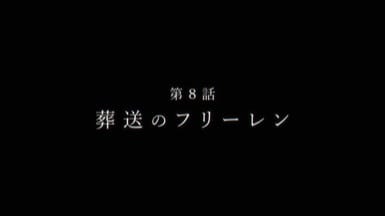
Sousou no Frieren – 06 & 07 – Random Interest
Episode 06
「村の英雄」 (Mura no Eiyū)
“The Hero of the Village”
It’s interesting and a little challenging for me to analyze Sousou no Frieren. On paper, it was one of the very few shows—I don’t adore it crazy, but I like it a lot—where that seemed like a real possibility. However, given its nature, it’s possible that this cannot be helped. It’s not the kind of thing that grabs you by the scruff of the neck and forces you to bow down before its grandeur. It more closely resembles a brainworm that gently entices you into its worldview and spreads its effects. Like the proverbial frog in the cold water set in a pot on the burner (which, incidentally, is not true).
The inclusion of Stark in this recipe is the major news item. In principle, this is wonderful because I didn’t think Frieren and Fern to be that compelling as a couple. And I believe in practice as well. The three-way chemistry between them is more interesting than the two-way chemistry was, and it enables the character-side of the story to take some fresh turns. Of course, many will head straight for the shipping routes, but I don’t get the impression that the story will take that turn very often (and it’s not because of the x-ray vision spell, either). To be honest, I don’t care.
Despite being Eisen’s student, I believe Stark most closely resembles Himmel in the party. However, he has a very different personality from Himmel (in some ways, at least). He’s constantly being referred to as a coward, but I don’t view him that way. Instead, I see him as merely a man with enough common sense to be scared of scary things, like the dragon, as it turns out. We are wired for dread, as Eisen points out; there is nothing to be embarrassed of. It keeps you alive, especially in a dangerous world like this one from the Middle Ages. Fern is correct that Stark would never have fled and abandoned the hamlet when the s— struck the fan; nevertheless, Stark never abdicated his duty to the village (which he never asked for in the first place).
Eisen shared Stark’s fear of dragons and of power, which should indicate how strong Stark (possibly) is. The flashbacks confirm that there was affection between them even though they “parted in anger” (they also confirm that the barkeep is full of it). Stark believes that by accompanying Frieren since the dwarf is too elderly to travel alone, he is acting in Eisen’s place (and I agree with him). Eisen’s “fun and ridiculous” moments were his proudest moments, and they had a greater effect on Frieren than she is willing to acknowledge.
In the end, the dragon doesn’t really matter much (am I the only one who has a soft spot in my heart for the dragon?). Stark’s potential is really impressive if he is already powerful enough to defeat a dragon without the assistance of Frieren. For the time being, however, it’s back to the road and the same village from which the heroes’ company set out for the northern countries all those years ago. This time, the checkpoint to the north is closed due to the battle and monsters wreaking devastation there; Fern told a few merchants that it might remain closed for two years.
Frieren would be okay with it because all he wants to do is explore the hidden magic shops and read grimoires. The sound of Fern and Stark’s ticking clocks is deafening in their youth, but they are not only mortal but also youthful. Since Fern dislikes having to share her mother figure with anyone else, there is already a rather intriguing dynamic between them. However, their current situation makes them allies; two years is not an option, especially for Stark, who needs to return in time to regale Eisen, who is getting older, with tales of his ludicrous and enjoyable experiences. In the end, more than anything the kids can do on their own, Frieren is destroyed by her own notoriety.
In isolation, none of these is really captivating. But because to Evan Call’s superb score, this is a performance where the total frequently seems to be greater than the sum of its parts. Sousou no Frieren is by nature more of an observer than a participant, giving the impression that the audience is listening in on the characters’ daily life. It doesn’t so much reward patience as it does demand it, and the more the viewer surrenders to it, the more influence these frequently unremarkable and unimportant moments have on them. As the story goes on, I’m hoping that will get easier and easier to achieve.
Episode 07
「おとぎ話のようなもの」 (Otogibanashi no Yō na Mono)
“Like a Fairy Tale”
I definitely didn’t anticipate some of the road forks here. Instead of the usual meanders that Sousou no Frieren has favored up to this point, there are more like twists and turns. It’s always fascinating to observe what occurs when a slice-of-life series goes to a plot-driven mode; some can manage it, while others can’t. It will also be intriguing to observe how long it lasts and if this represents a change or (more likely) an exception. And if the latter, how often they will be in the future.
We do get off to a Frieren-like start with Fern giggling about Frieren getting up by herself and a fight with Stark over how to address him. She shifts to showing extreme disdain after he reprimands her for calling him “Stark-sama” despite the fact that he is only a few years older. Although I doubt Fern understands it on that level, it seems very evident that Fern dislikes having to share her mother figure with another child. It remains to be seen how that will affect the tension that seems to be developing between them romantically.
Even though Frieren’s discussion of the elves is the first background we’ve heard about them, it creates more questions than it does answers. They are uncommon, maybe extinct, and typically uninterested in relationships or reproduction (which raises the question of how they have endured for so long). Even yet, Frieren claims that she hasn’t seen a person of her type in 400 years. When they arrive in the following town, it is already in the midst of yet another festival honoring the heroes’ celebration, complete with yet another statue of each. This is due to a very heartwarming reason: Himmel wanted to leave as many monuments as he could so Frieren wouldn’t be left alone in the future.
However, the aforementioned hairpin turns begin to occur as they reach the next significant city to the north. As soon as they arrive, Frieren senses the presence of demons and enters Defcon 1. Demons exist, and there are three of them accompanying Graf Granat (Sakuya Shunsuke), the mayor of the city. Frieren’s reply gets her locked up for a period of “two or three years” because these are peace envoys. She seems to be okay with that as long as she has something to read, but she completely rejects the notion of bargaining with devils.
This is an extremely intriguing change, and a very intriguing perspective on demons; Helck this is not. Frieren recounts to the children the tale of a confrontation the heroes’ group had with a little demon girl who had just slain and devoured a villager. Frieren intervenes as Himmel is about to kill her and hesitates. When the demon cries, “Mom, it hurts,” the village leader intervenes as well, arguing that they are better than this because they are human. When the demon kid kills him and his wife and offers their daughter as a replacement for the one she ate, he pays the price for having taken the demon child into his home and caring for her for what seems like a long time.
This is yet another interesting take on demons. Not necessarily malevolent, but completely amoral—literally unable to view events via a human moral prism. They have evolved human speech and a resemblance to humans in order to assist them prey on people, according to Frieren, who claims that they are derived from creatures that drew humans in with cries of “Help!” Lügner, their “negotiator” (Suwabe Junichi), just wants to convince Granat to weaken the city’s fortifications so that Aura the Guillotine can lead her troops in and massacre the inhabitants. According to Frieren, this is the culmination of their evolution; they now replicate human speech and behavior to appeal to their feeling of duty and moral superiority.
The writing is excellent, and there are many intriguing possibilities throughout. It couldn’t escape my attention that Aura had made a comeback 28 years prior to Himmel’s passing; this may or may not have been a coincidence. Demons may also be monolithic in this sense, which would be a daring decision for the story if true. Frieren openly considers utilizing the chaos when the city falls as a means of escaping, suggesting that she isn’t really worried about the outcome. However, it appears that Frieren is a prodigious demon slayer. Draht, a lieutenant of Lügner, decides on his own to assassinate Frieren in her cell, but he is in for a big surprise (Ohsuzu Kouki, the first role I’ve heard him in since Ao Ashi).
It must be noted that even when Sousou no Frieren drastically alters its structural composition as it did in this instance, it doesn’t truly alter its stylistic composition, which makes the changeover less abrupt than it might otherwise be. The majority of the characters behave as though they are still in a slice of life, there is little shouting, and the killing is done quietly and without ceremony. In this regard, Lügner and the demons are the ideal adversary for Team Frieren to battle because of their absolutely stoic demeanor.
Full-length images: 36.
End Card
 |


